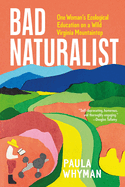
Paula Whyman had long dreamed of buying a piece of land in the countryside and restoring a meadow or forest to its original ecological state. In her wry, well-researched memoir Bad Naturalist, Whyman (You May See a Stranger) debunks her own assumptions about restoration, native and invasive species, and the myth of an unchanging "natural" state. From the 200 acres in Virginia that became her ongoing project, Whyman explores the long-term effects of human intervention and the constant action required for continued flourishing.
Naïvely, Whyman hoped to purchase a few acres, pull a few weeds, and make her land more hospitable to birds, insects, and native plants. But she quickly learned it's not that simple. Centuries of human activity, including logging, mining, and the liberal use of pesticides, have permanently affected the land, although some native species persist. Whyman embarked on a crash course in the ecology of Virginia's flora and fauna. To her dismay, she found invasive plants everywhere and was forced to use herbicides to combat the worst offenders. Every choice she made had ripple effects, not only on the invasive species but also on the native ones she was trying to protect.
As she gathers (often conflicting) advice from experts, Whyman muses on the interdependence between people and place. She and her land may never arrive at a tidy conclusion, but she insists that stewardship of the land is worth it. Bad Naturalist is a fascinating look at how human activity shapes landscapes, and a call to be flexible and diligent in caring for them. --Katie Noah Gibson, blogger at Cakes, Tea and Dreams

